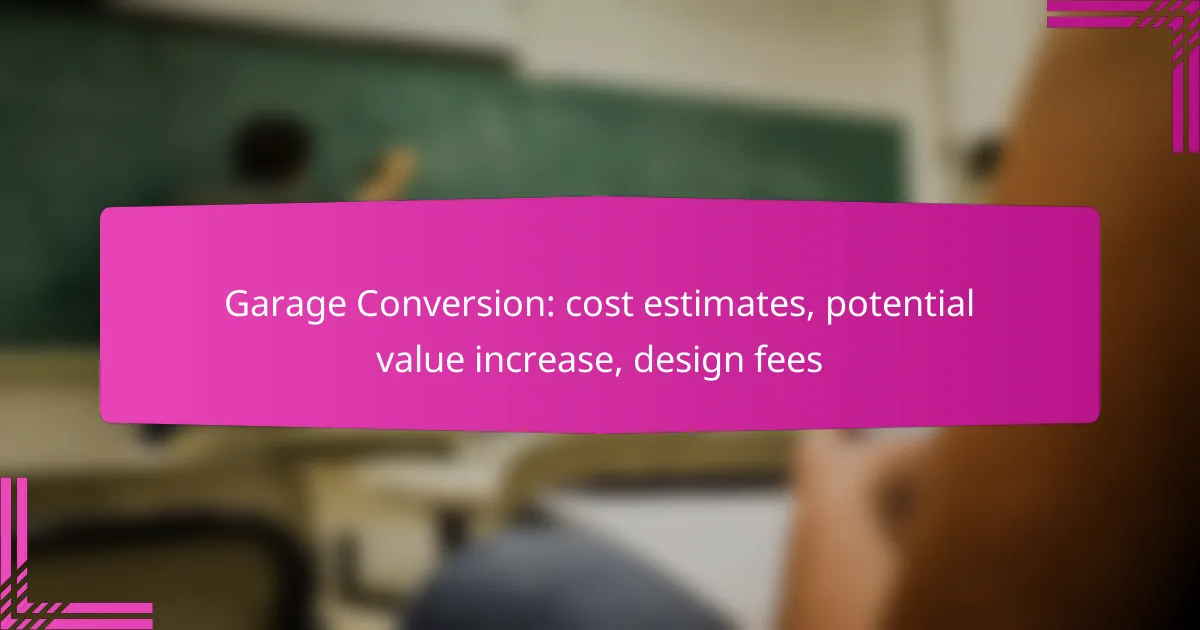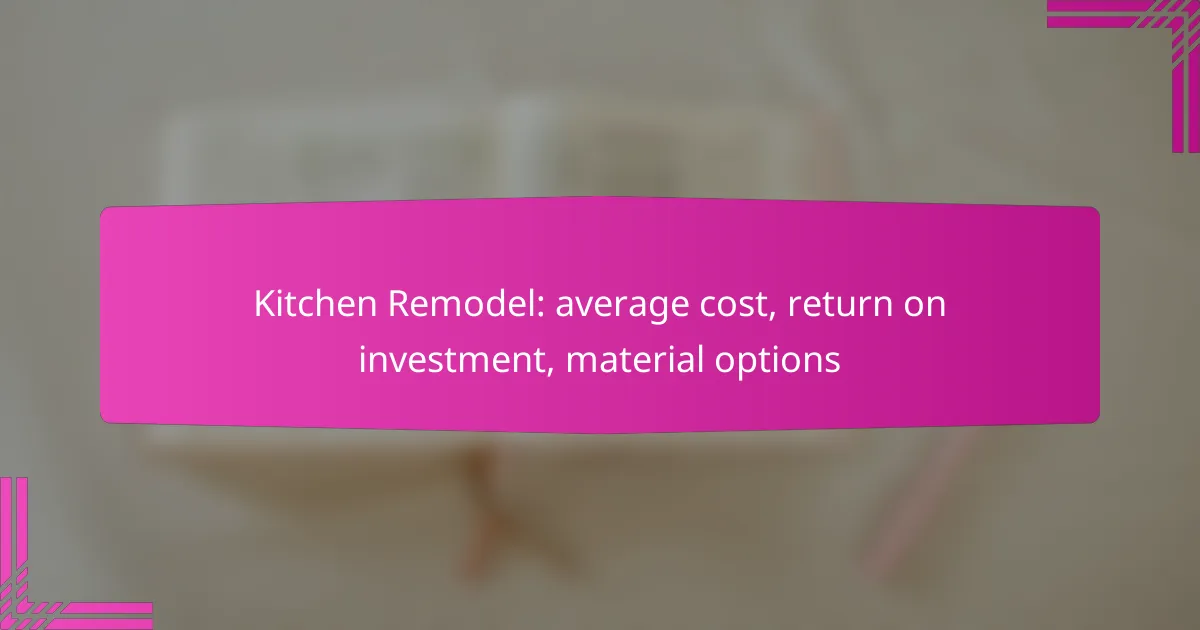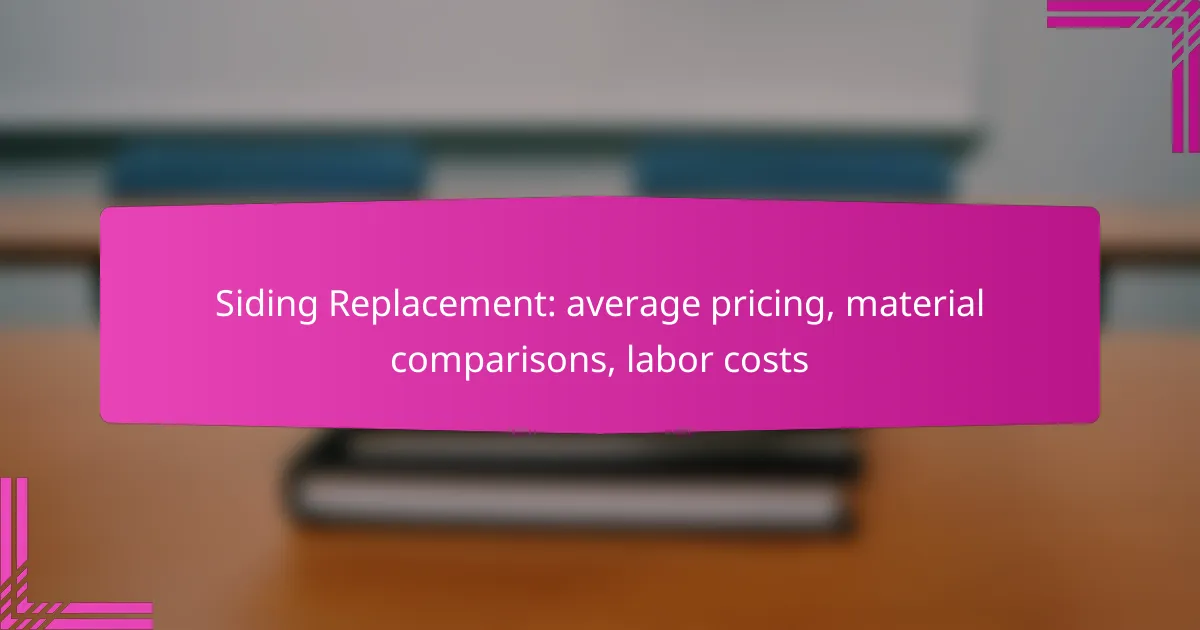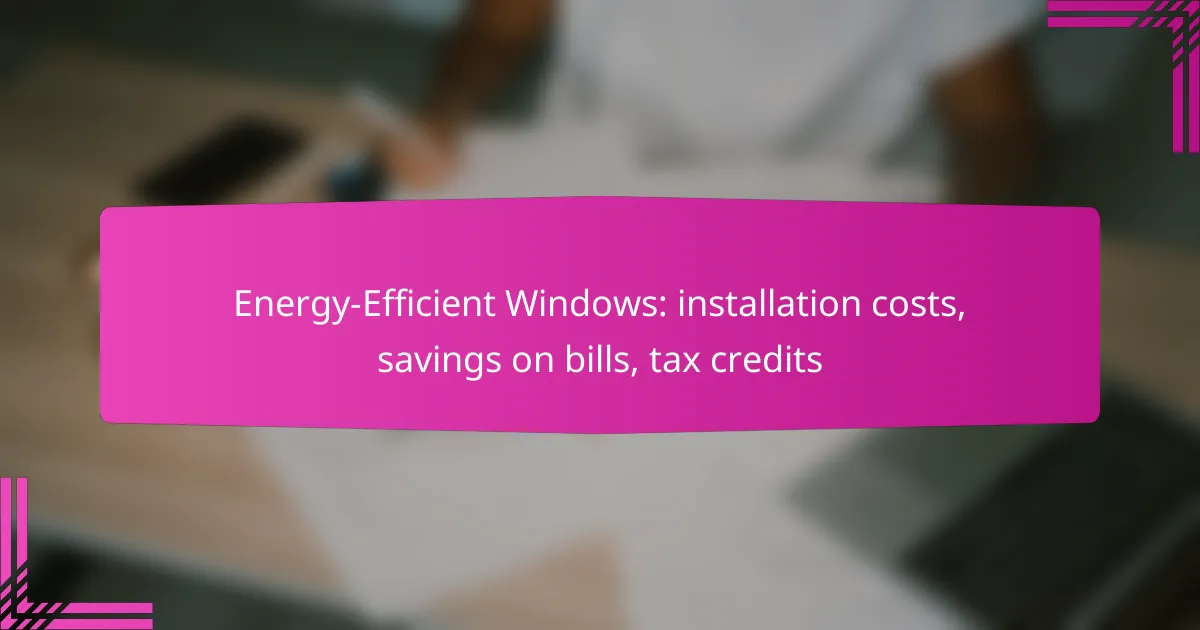Converting a garage can be a smart investment, with costs typically ranging from £5,000 to £20,000 based on size, design, and location. This transformation not only creates additional living space but can also boost your property’s value by 10-20%. It’s important to factor in design fees, which can vary widely, as they play a crucial role in the overall budget for the project.
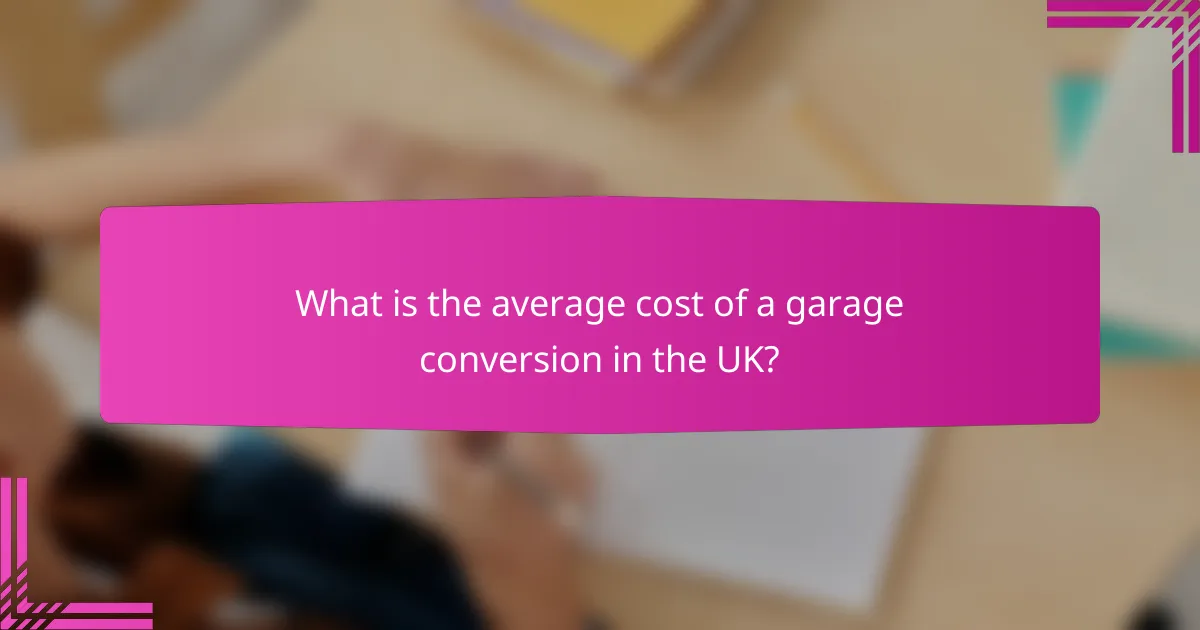
What is the average cost of a garage conversion in the UK?
The average cost of a garage conversion in the UK typically ranges from £5,000 to £20,000, depending on various factors such as size, design, and location. This investment can significantly enhance your property’s value while providing additional living space.
Cost range for standard conversions
Standard garage conversions generally fall between £8,000 and £15,000. This price range usually covers basic insulation, flooring, and electrical work, transforming the garage into a usable room like a home office or extra bedroom.
For more extensive conversions that include plumbing or bespoke design features, costs can rise to £20,000 or more. It’s essential to budget for potential unexpected expenses during the project.
Factors influencing conversion costs
Local labor rates and material costs are crucial considerations. Hiring skilled contractors may come at a premium, but their expertise can lead to a higher-quality finish. Always obtain multiple quotes to ensure competitive pricing.
Regional cost variations
Costs for garage conversions can vary significantly across the UK. For instance, conversions in London and the South East tend to be more expensive, often exceeding £20,000 due to higher labor and material costs. In contrast, areas in the North may see prices starting around £5,000.
It’s advisable to research local market rates and consult with professionals familiar with your region. This approach helps in understanding the typical costs and ensures you get a fair deal for your garage conversion project.

How much value can a garage conversion add to a property?
A garage conversion can significantly increase a property’s value, often adding around 10-20% depending on various factors. This improvement not only enhances living space but also appeals to potential buyers seeking functional areas in a home.
Percentage increase in property value
The percentage increase in property value from a garage conversion varies widely based on location and the quality of the conversion. Generally, homeowners can expect an increase of 10-20% in value, with some areas seeing even higher returns.
For example, in urban areas where space is at a premium, a well-executed garage conversion can yield a higher percentage increase compared to rural locations. Additionally, the type of conversion—whether it’s a simple living space or a more elaborate guest suite—can influence the final value increase.
Market trends in the UK
In the UK, garage conversions have become increasingly popular as homeowners look to maximize their property’s potential without moving. Recent market trends indicate a growing demand for additional living spaces, particularly in cities where housing is limited.
According to property experts, the trend is expected to continue as more families seek flexible spaces for work, leisure, or guest accommodation. Homeowners should consider local market conditions and consult with real estate professionals to understand how a garage conversion could impact their specific property value.

What design fees should be expected for a garage conversion?
Design fees for a garage conversion typically range from a few hundred to several thousand dollars, depending on the complexity of the project and the designer’s experience. It’s essential to budget for these costs as they can significantly impact the overall project expenses.
Typical design fee ranges
Design fees for garage conversions generally fall between 5% to 15% of the total project cost. For a conversion costing around $20,000, this could mean design fees of $1,000 to $3,000. Some designers may charge a flat fee, while others might bill hourly, with rates varying widely based on location and expertise.
Factors affecting design fees
Local market conditions also affect pricing; urban areas with higher living costs may see elevated design fees compared to rural locations. Lastly, the scope of services offered, such as project management or obtaining permits, can further impact the overall design fees.

What are the key considerations before starting a garage conversion?
Before starting a garage conversion, it’s essential to consider planning permissions, building regulations, and the potential impact on your property’s value. These factors can significantly influence the feasibility and legality of your project.
Planning permission requirements
In many areas, converting a garage into a living space may require planning permission, especially if the conversion alters the external appearance of the property. Check with your local planning authority to determine if your project falls under permitted development or if formal permission is necessary.
Common requirements may include maintaining the original structure’s integrity and ensuring that the conversion does not negatively impact neighboring properties. It’s advisable to submit detailed plans and consult with professionals to navigate this process effectively.
Building regulations compliance
Building regulations ensure that any conversion meets safety and structural standards. This typically includes aspects such as insulation, fire safety, and electrical installations. You will need to submit your plans to the local building control department for approval.
Compliance may involve inspections at various stages of the conversion. It’s crucial to work with qualified contractors who are familiar with local regulations to avoid costly modifications later on. Ignoring these regulations can lead to fines or the need to reverse the conversion.

How to choose a contractor for a garage conversion?
Choosing a contractor for a garage conversion involves evaluating their experience, qualifications, and past work. A well-selected contractor can ensure that your project meets your expectations and complies with local regulations.
Criteria for selecting a contractor
When selecting a contractor, consider their experience specifically with garage conversions. Look for professionals who have completed similar projects and can provide references or a portfolio showcasing their work. Additionally, verify their licensing and insurance to ensure they meet local requirements.
Another important criterion is the contractor’s communication style. A good contractor should be responsive, open to discussing your ideas, and willing to provide updates throughout the project. This ensures that any issues can be addressed promptly, reducing potential delays.
Questions to ask potential contractors
Ask potential contractors about their experience with garage conversions, including the number of projects they have completed and any challenges they faced. Inquire about their approach to project management and how they handle unforeseen issues that may arise during construction.
Additionally, discuss timelines and budgets. Request a detailed estimate that breaks down costs for materials, labor, and any additional fees. This transparency will help you avoid unexpected expenses later on. Lastly, ask for references from previous clients to gauge their satisfaction with the contractor’s work.

What are the common design styles for garage conversions?
Garage conversions can take on various design styles, each tailored to meet specific needs and aesthetic preferences. Popular options include modern, traditional, and industrial designs, which can enhance the functionality and appearance of the space.
Popular design styles in the UK
In the UK, common design styles for garage conversions include contemporary, rustic, and minimalist. Contemporary designs often feature open spaces with large windows and sleek finishes, while rustic styles incorporate natural materials like wood and stone for a cozy feel. Minimalist designs focus on simplicity and functionality, using clean lines and a limited color palette.
Each style can be adapted to suit the surrounding architecture and personal taste, ensuring that the converted garage blends seamlessly with the rest of the home. Homeowners should consider local trends and neighborhood aesthetics when choosing a design style.
Functional design considerations
When planning a garage conversion, it’s essential to consider the intended use of the space. Whether transforming it into a living area, home office, or gym, the design should facilitate that function. For example, incorporating adequate insulation, heating, and lighting is crucial for comfort and usability.
Additionally, consider the flow between the converted space and the rest of the home. Open-plan designs can create a sense of spaciousness, while defined areas may be more suitable for specific uses. Always check local building regulations to ensure compliance with safety and zoning requirements.

What are the potential challenges during a garage conversion?
Garage conversions can present various challenges, including structural issues, zoning regulations, and budget constraints. Understanding these potential hurdles is crucial for a successful transformation.
Common issues faced
One common issue during garage conversions is the need for structural reinforcement. Many garages are not built to support living space, which may require additional support beams or foundation work. Additionally, plumbing and electrical systems may need upgrades to meet residential standards.
Zoning regulations can also pose challenges. Local laws may restrict the type of modifications allowed or require permits, which can delay the project. Homeowners should check with local authorities to ensure compliance before starting the conversion.
How to mitigate challenges
To address structural issues, consider hiring a qualified contractor to assess the garage and recommend necessary reinforcements. This upfront investment can prevent costly repairs later on. It’s advisable to budget for unexpected expenses, typically around 10-20% of the total project cost.
To navigate zoning regulations, research local building codes and consult with your municipality. Obtaining the required permits early in the process can help avoid delays. Engaging a professional designer familiar with local regulations can streamline this aspect of the project.

What are the emerging trends in garage conversions?
Garage conversions are increasingly popular as homeowners seek to maximize their living space and add value to their properties. Current trends focus on multifunctional designs, sustainability, and smart home technology integration.
Sustainable design practices
Sustainable design practices in garage conversions emphasize energy efficiency and environmentally friendly materials. Homeowners are opting for insulation materials with high R-values, energy-efficient windows, and sustainable flooring options like bamboo or reclaimed wood.
Incorporating renewable energy sources, such as solar panels, can further enhance sustainability. This not only reduces energy bills but also increases the property’s appeal to eco-conscious buyers.
When planning a sustainable garage conversion, consider local building codes and regulations regarding energy efficiency. Many regions offer incentives for using green materials, which can offset initial costs.
